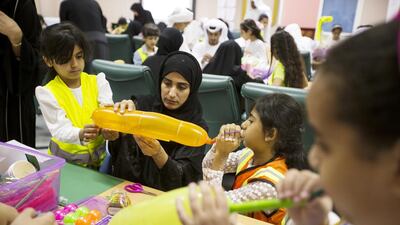ABU DHABI // Paper clips, ice lolly sticks and rubber bands may not sound like hi-tech materials but these were just some of the items used to teach youngsters about sophisticated aerospace engineering concepts.
The Curiosity Machine, an after-school programme by Boeing, Abu Dhabi Education Council and Mubadala, paired Emirati aerospace engineers with public school pupils and their families to solve hands-on design challenges.
Each Monday during the five-week programme, pupils from grades three to six, together with their siblings and mothers, packed into a large room at Al Afaaq girls school to learn to create engineering projects such as a robotic arm, helicopter, airplane and satellite.
“It changed our minds how science is so easy, you can find it around you in the house,” said Mariam Al Zaabi, whose daughters Reem, 8, and Sheikha, 6, joined for the weekly sessions. “It made a spark in my head that science is something doable, something easy, something children can learn easily in the house and implement it as well in the schools.
“This will build a bridge because normally science is the last subject we think about.”
Boeing spokeswoman Dana Salloum said the parents were trained on how to coach and encourage their children to learn from trial and error.
“The whole concept of engineering is trial and error. You design to solve a problem. You test it, it doesn’t work, you go back to the drawing board,” she said. “It’s trying to mimic the engineering process in a simpler way, in a fun way.”
Engineers recruited by Mubadala were trained as volunteer mentors to teach the children stem concepts behind each challenge, such as potential and kinetic energy, aerodynamics, solar arrays, dynamic constraints and Newton’s Third Law of Motion, to name a few.
Ibrahim Al Ali, an engineer with Advanced Military Maintenance Repair and Overhaul Centre, was impressed with how well the children tackled the weekly design challenges.
“I’m an aircraft engineer and I was surprised with the ideas coming from the students,” said the 27-year-old. “We’re proud of our children and the parents.”
Jacinta Bradley, one of five public school teachers who volunteered for the programme, said the engineer-led projects helped the children appreciate the real-world applications of stem subjects.
“They’re starting to see how maths work outside of the classroom,” she said. “There’s a purpose to what they’re doing.
“It really forces them to stop and think at another level. It’s encouraging them to be independent. At the end they all present, so they want a finished product, they want to be part of that and show off what they made.”
With the after-school programme ending last week, the parents and pupils were encouraged to try other design challenges suggested on the curiositymachine.org website.
The programme will be offered at two public schools in the next academic year and plans are under consideration to expand it to more in the future.
rpennington@thenational.ae

